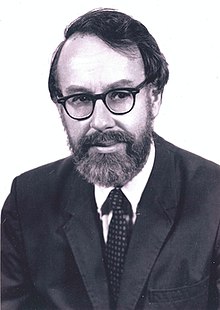| Warren Cowgill | |
|---|---|
 | |
| Born | (1929-12-19)December 19, 1929 Grangeville, Idaho, U.S. |
| Died | June 20, 1985(1985-06-20) (aged 55) New Haven, Connecticut |
| Spouses |
|
| Children | 1 (born 1967) |
| Parents |
|
| Relatives | George Cowgill (twin brother) |
| Academic background | |
| Education | |
| Thesis | The Indo-European Long-Vowel Preterits (1957) |
| Doctoral advisor |
|
| Academic work | |
| Institutions | Yale University |
| Main interests | Indo-European languages |
Warren Crawford Cowgill (/ˈkoʊɡɪl/ KOH-gill; December 19, 1929 – June 20, 1985) was an American linguist. He was a professor of linguistics at Yale University and the Encyclopædia Britannica's authority on Indo-European linguistics. Two separate Indo-European sound laws are named after him, Cowgill's law of Greek and Cowgill's law of Germanic.
Cowgill was unusual among Indo-European linguists of his time in believing that Indo-European should be classified as a branch of Indo-Hittite, with Hittite as a sister language of the Indo-European languages, rather than a daughter language.
Warren Cowgill and his twin brother, anthropologist George Cowgill, were born near Grangeville, Idaho. Along with his brother, he graduated from Stanford University in 1952 and received a Ph.D. from Yale in 1957. He was a member of the Yale faculty in the Department of Linguistics until his death in 1985.
References
- Cowgill, Warren C. (2006). "Cowgill on Cowgill: Autobiographical Letter to the LSA Archives" (PDF). In Klein, Jared (ed.). The Collected Writings of Warren Cowgill. Ann Arbor, Michigan: Beech Stave Press. p. xlvii. ISBN 0-9747927-1-3.
the first syllable rhymes with know, not with how.
- "Indo-European languages," Encyclopædia Britannica 2007 Ultimate Reference Suite, Chicago 2007.
- "Dr. Warren C. Cowgill". The New York Times. June 25, 1985. Archived from the original on January 30, 2013.
- "Linguistics at Yale University". Retrieved March 23, 2007.
External links
- Table of contents for The Collected Writings of Warren Cowgill (ISBN 0-9747927-1-3)
This biography of a United States linguist is a stub. You can help Misplaced Pages by expanding it. |